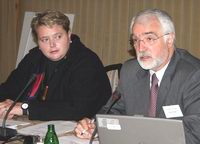- Serbia
Get to know Serbia
- Citizens
Culture and science
Health services
Pension and disability insurance
- Business
Employment
Economy
- Media
- Government
- Contact
Keep in touch
Contact form
Back
Keepin touch
Whether you have a question, comment, suggestion or any problem in the purview of the government, send us your message and we will try to respond as soon as possible. If your problem is not in our purview, we will forward your message to the relevant institution.
Q:
A:
World Bank to float between $400 million and $550 million for Serbian reforms
Belgrade,
28 September 2004
World Bank Country Manager for Serbia-Montenegro Carolyn Jungr said today that the bank will approve between $400 million and $550 million in loans to Serbia over the next three years to support the country’s reform process. According to Jungr, 70% of the funding will be appropriated for the Serbian budget.
A World Bank support project for Serbia in the period between July 1, 2005 and July 1, 2007 aims to help the country cut public spending, develop the private sector and alleviate poverty and unemployment, Jungr noted.
Serbia will receive some $100 million in loans in 2005, $175 million in 2006 and $275 million in 2007, she explained, adding that the size of loans will depend on the pace and efficiency of reforms.
Serbian Deputy Prime Minister Miroljub Labus said that Serbia has achieved macroeconomic stability and that it is heading for "at least relative macroeconomic stability" over the next three years.
Over the same period, GDP growth will stand at some five percent, said Labus, who warned that the balance of payment gap is Serbia's major concern.
Noting that a stable economic growth will help improve employment and reduce poverty, Labus said that the government will seek to speed up privatisation, resume bank restructuring and wrap up financial sector reforms by January 1 when it is due to introduce Value Added Tax (VAT).
Commenting on Serbia's privatisation process, the Deputy Prime Minister said that the state has so far sold its best performing companies that were least indebted. He noted that 66 large public enterprises are awaiting sale, 35 of which received nearly 18 billion dinars in state subsidies over the past four years.
Serbia will receive some $100 million in loans in 2005, $175 million in 2006 and $275 million in 2007, she explained, adding that the size of loans will depend on the pace and efficiency of reforms.
Serbian Deputy Prime Minister Miroljub Labus said that Serbia has achieved macroeconomic stability and that it is heading for "at least relative macroeconomic stability" over the next three years.
Over the same period, GDP growth will stand at some five percent, said Labus, who warned that the balance of payment gap is Serbia's major concern.
Noting that a stable economic growth will help improve employment and reduce poverty, Labus said that the government will seek to speed up privatisation, resume bank restructuring and wrap up financial sector reforms by January 1 when it is due to introduce Value Added Tax (VAT).
Commenting on Serbia's privatisation process, the Deputy Prime Minister said that the state has so far sold its best performing companies that were least indebted. He noted that 66 large public enterprises are awaiting sale, 35 of which received nearly 18 billion dinars in state subsidies over the past four years.
-
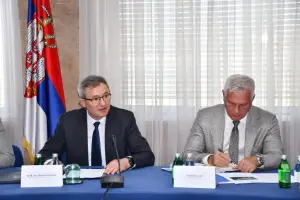 Belgrade, 27 October 2025
Belgrade, 27 October 2025Construction of Selova dam of vital importance for southeast Serbia
-
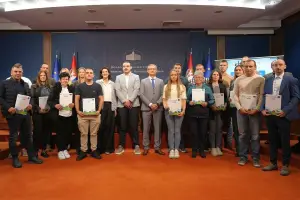 Belgrade, 22 October 2025
Belgrade, 22 October 2025First 19 resolutions awarded under IPARD III for procurement of new tractors
-
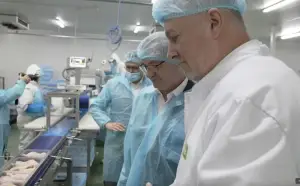 Šid, 21 October 2025
Šid, 21 October 2025Superior Foods example of successful Serbia-Hungary cooperation
-
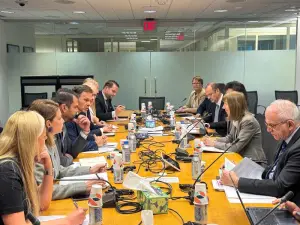 Belgrade/Washington, 17 October 2025
Belgrade/Washington, 17 October 2025Confirmation of Serbia’s position as attractive investment destination
-
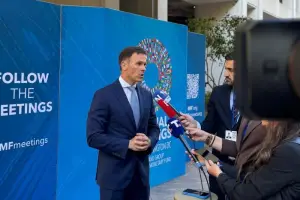 Belgrade/Washington, 16 October 2025
Belgrade/Washington, 16 October 2025Serbian economy maintains stability amid global challenges
-
 Sombor, 14 October 2025
Sombor, 14 October 2025Agriculture one of major pillars of bilateral cooperation with Italy
-
 Belgrade, 13 October 2025
Belgrade, 13 October 2025First IPARD III resolutions on support to farmers presented
-
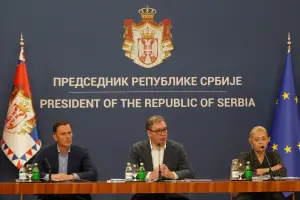 Belgrade, 21 September 2025
Belgrade, 21 September 2025Solution for legalisation of 4.8 million properties by year’s end
-
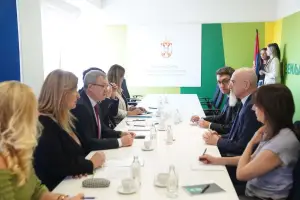 Belgrade, 19 September 2025
Belgrade, 19 September 2025Strong potential for Italian investments in Serbia’s processing sector
-
 Belgrade, 17 September 2025
Belgrade, 17 September 2025Serbia committed to building strong economic ties with Russia

